- Home
- George Orwell
Orwell in Spain Page 13
Orwell in Spain Read online
Page 13
‘Comrades! Ammunition! Plenty ammunition here!’
‘We don’t want ammunition,’ said a voice, ‘we want rifles.’
This was true. Half our rifles were jammed with mud and unusable. They could be cleaned, but it is dangerous to take the bolt out of a rifle in the darkness; you put it down somewhere and then you lose it. I had a tiny electric torch which my wife had managed to buy in Barcelona, otherwise we had no light of any description between us. A few men with good rifles began a desultory fire at the flashes in the distance. No one dared fire too rapidly; even the best of the rifles were liable to jam if they got too hot. There were about sixteen of us inside the parapet, including one or two who were wounded. A number of wounded, English and Spanish, were lying outside. Patrick O’Hara, a Belfast Irishman who had had some training in first-aid, went to and fro with packets of bandages, binding up the wounded men and, of course, being shot at every time he returned to the parapet, in spite of his indignant shouts of ‘POUM!’
We began searching the position. There were several dead men lying about, but I did not stop to examine them. The thing I was after was the machine-gun. All the while when we were lying outside I had been wondering vaguely why the gun did not fire. I flashed my torch inside the machine-gun nest. A bitter disappointment! The gun was not there. Its tripod was there, and various boxes of ammunition and spare parts, but the gun was gone. They must have unscrewed it and carried it off at the first alarm. No doubt they were acting under orders, but it was a stupid and cowardly thing to do, for if they had kept the gun in place they could have slaughtered the whole lot of us. We were furious. We had set our hearts on capturing a machine-gun.
We poked here and there but did not find anything of much value. There were quantities of Fascist bombs lying about – a rather inferior type of bomb, which you touched off by pulling a string – and I put a couple of them in my pocket as souvenirs. It was impossible not to be struck by the bare misery of the Fascist dug-outs. The litter of spare clothes, books, food, petty personal belongings that you saw in our own dug-outs was completely absent; these poor unpaid conscripts seemed to own nothing except blankets and a few soggy hunks of bread. Up at the far end there was a small dug-out which was partly above ground and had a tiny window. We flashed the torch through the window and instantly raised a cheer. A cylindrical object in a leather case, four feet high and six inches in diameter, was leaning against the wall. Obviously the machine-gun barrel. We dashed round and got in at the doorway, to find that the thing in the leather case was not a machine-gun but something which, in our weapon-starved army, was even more precious. It was an enormous telescope, probably of at least sixty or seventy magnifications, with a folding tripod. Such telescopes simply did not exist on our side of the line and they were desperately needed. We brought it out in triumph and leaned it against the parapet, to be carried off later.
At this moment someone shouted that the Fascists were closing in. Certainly the din of firing had grown very much louder. But it was obvious that the Fascists would not counter-attack from the right, which meant crossing no-man’s-land and assaulting their own parapet. If they had any sense at all they would come at us from inside the line. I went round to the other side of the dug-outs. The position was roughly horseshoe-shaped, with the dug-outs in the middle, so that we had another parapet covering us on the left. A heavy fire was coming from that direction, but it did not matter greatly. The danger-spot was straight in front, where there was no protection at all. A stream of bullets was passing just overhead. They must be coming from the other Fascist position further up the line; evidently the Shock Troopers had not captured it after all. But this time the noise was deafening. It was the unbroken, drum-like roar of massed rifles which I was used to hearing from a little distance; this was the first time I had been in the middle of it. And by now, of course, the firing had spread along the line for miles around. Douglas Thompson, with a wounded arm dangling useless at his side, was leaning against the parapet and firing one-handed at the flashes. Someone whose rifle had jammed was loading for him.
There were four or five of us round this side. It was obvious what we must do. We must drag the sandbags from the front parapet and make a barricade across the unprotected side. And we had got to be quick. The fire was high at present, but they might lower it at any moment; by the flashes all round I could see that we had a hundred or two hundred men against us. We began wrenching the sandbags loose, carrying them twenty yards forward and dumping them into a rough heap. It was a vile job. They were big sandbags, weighing a hundredweight each, and it took every ounce of your strength to prise them loose; and then the rotten sacking split and the damp earth cascaded all over you, down your neck and up your sleeves. I remember feeling a deep horror at everything: the chaos, the darkness, the frightful din, the slithering to and fro in the mud, the struggles with the bursting sandbags – all the time encumbered with my rifle, which I dared not put down for fear of losing it. I even shouted to someone as we staggered along with a bag between us: ‘This is war! Isn’t it bloody?’ Suddenly a succession of tall figures came leaping over the front parapet. As they came nearer we saw that they wore the uniform of the Shock Troopers, and we cheered, thinking they were reinforcements. However, there were only four of them, three Germans and a Spaniard. We heard afterwards what had happened to the Shock Troopers. They did not know the ground and in the darkness had been led to the wrong place, where they were caught on the Fascist wire and numbers of them were shot down. These were four who had got lost, luckily for themselves. The Germans did not speak a word of English, French, or Spanish. With difficulty and much gesticulation we explained what we were doing and got them to help us in building the barricade.
The Fascists had brought up a machine-gun now. You could see it spitting like a squib a hundred or two hundred yards away; the bullets came over us with a steady, frosty crackle. Before long we had flung enough sandbags into place to make a low breastwork behind which the few men who were on this side of the position could lie down and fire. I was kneeling behind them. A mortar-shell whizzed over and crashed somewhere in no-man’s-land. That was another danger, but it would take them some minutes to find our range. Now that we had finished wrestling with those beastly sandbags it was not bad fun in a way; the noise, the darkness, the flashes approaching, our own men blazing back at the flashes. One even had time to think a little. I remember wondering whether I was frightened, and deciding that I was not. Outside, where I was probably in less danger, I had been half sick with fright. Suddenly there was another shout that the Fascists were closing in. There was no doubt about it this time, the rifle-flashes were much nearer. I saw a flash hardly twenty yards away. Obviously they were working their way up the communication-trench. At twenty yards they were within easy bombing range; there were eight or nine of us bunched together and a single well-placed bomb would blow us all to fragments. Bob Smillie, the blood running down his face from a small wound, sprang to his knee and flung a bomb. We cowered, waiting for the crash. The fuse fizzled red as it sailed through the air, but the bomb failed to explode. (At least a quarter of these bombs were duds.) I had no bombs left except the Fascist ones and I was not certain how these worked. I shouted to the others to know if anyone had a bomb to spare. Douglas Moyle felt in his pocket and passed one across. I flung it and threw myself on my face. By one of those strokes of luck that happen about once in a year I had managed to drop the bomb almost exactly where the rifle had flashed. There was the roar of the explosion and then, instantly, a diabolical outcry of screams and groans. We had got one of them, anyway; I don’t know whether he was killed, but certainly he was badly hurt. Poor wretch, poor wretch! I felt a vague sorrow as I heard him screaming. But at the same instant, in the dim light of the rifle-flashes, I saw or thought I saw a figure standing near the place where the rifle had flashed. I threw up my rifle and let fly. Another scream, but I think it was still the effect of the bomb. Several more bombs were thrown. The next rifle-flashes we saw
were a long way off, a hundred yards or more. So we had driven them back, temporarily at least.
Everyone began cursing and saying why the hell didn’t they send us some supports. With a sub-machine-gun or twenty men with clean rifles we could hold this place against a battalion. At this moment Paddy Donovan, who was second-in-command to Benjamin and had been sent back for orders, climbed over the front parapet.
‘Hi! Come on out of it! All men to retire at once!’
‘What?’
‘Retire! Get out of it!’
‘Why?’
‘Orders. Back to our own lines double-quick.’
People were already climbing over the front parapet. Several of them were struggling with a heavy ammunition box. My mind flew to the telescope which I had left leaning against the parapet on the other side of the position. But at this moment I saw that the four Shock Troopers, acting I suppose on some mysterious orders they had received beforehand, had begun running up the communication-trench. It led to the other Fascist position and – if they got there – to certain death. They were disappearing into the darkness. I ran after them, trying to think of the Spanish for ‘retire’; finally I shouted, ‘Atrás! Atrás!’, which perhaps conveyed the right meaning. The Spaniard understood it and brought the others back. Paddy was waiting at the parapet.
‘Come on, hurry up.’
‘But the telescope!’
‘Bugger the telescope! Benjamin’s waiting outside.’
We climbed out. Paddy held the wire aside for me. As soon as we got away from the shelter of the Fascist parapet we were under a devilish fire that seemed to be coming at us from every direction. Part of it, I do not doubt, came from our own side, for everyone was firing all along the line. Whichever way we turned a fresh stream of bullets swept past; we were driven this way and that in the darkness like a flock of sheep. It did not make it any easier that we were dragging a captured box of ammunition – one of those boxes that hold 1750 rounds and weigh about a hundredweight – besides a box of bombs and several Fascist rifles. In a few minutes, although the distance from parapet to parapet was not two hundred yards and most of us knew the ground, we were completely lost. We found ourselves slithering about in a muddy field, knowing nothing except that bullets were coming from both sides. There was no moon to go by, but the sky was growing a little lighter. Our lines lay east of Huesca; I wanted to stay where we were till the first crack of dawn showed us which was east and which was west; but the others were against it. We slithered onwards, changing our direction several times and taking it in turns to haul at the ammunition-box. At last we saw the low flat line of a parapet looming in front of us. It might be ours or it might be the Fascists’; nobody had the dimmest idea which way we were going. Benjamin crawled on his belly through some tall whitish weeds till he was about twenty yards from the parapet and tried a challenge. A shout of ‘POUM!’ answered him. We jumped to our feet, found our way along the parapet, slopped once more through the irrigation ditch – splash-gurgle! – and were in safety.
Kopp was waiting inside the parapet with a few Spaniards. The doctor and the stretchers were gone. It appeared that all the wounded had been got in except Jorge and one of our own men, Hiddlestone by name, who were missing. Kopp was pacing up and down, very pale. Even the fat folds at the back of his neck were pale; he was paying no attention to the bullets that streamed over the low parapet and cracked close to his head. Most of us were squatting behind the parapet for cover. Kopp was muttering. ‘Jorge! Coño! Jorge!’ And then in English. ‘If Jorge is gone it is terreeble, terreeble!’ Jorge was his personal friend and one of his best officers. Suddenly he turned to us and asked for five volunteers, two English and three Spanish, to go and look for the missing men. Moyle and I volunteered with three Spaniards.
As we got outside the Spaniards murmured that it was getting dangerously light. This was true enough; the sky was dimly blue. There was a tremendous noise of excited voices coming from the Fascist redoubt. Evidently they had reoccupied the place in much greater force than before. We were sixty or seventy yards from the parapet when they must have seen or heard us, for they sent over a heavy burst of fire which made us drop on our faces. One of them flung a bomb over the parapet – a sure sign of panic. We were lying in the grass, waiting for an opportunity to move on, when we either heard or thought we heard – I have no doubt it was pure imagination, but it seemed real enough at the time – that the Fascist voices were much closer. They had left the parapet and were coming after us. ‘Run!’ I yelled to Moyle, and jumped to my feet. And heavens, how I ran! I had thought earlier in the night that you can’t run when you are sodden from head to foot and weighted down with a rifle and cartridges; I learned now you can always run when you think you have fifty or a hundred armed men after you. But if I could run fast, others could run faster. In my flight something that might have been a shower of meteors sped past me. It was the three Spaniards, who had been in front. They were back to our own parapet before they stopped and I could catch up with them. The truth was that our nerves were all to pieces. I knew, however, that in a half-light one man is invisible where five are clearly visible, so I went back alone. I managed to get to the outer wire and searched the ground as well as I could, which was not very well, for I had to lie on my belly. There was no sign of Jorge or Hiddlestone, so I crept back. We learned afterwards that both Jorge and Hiddlestone had been taken to the dressing-station earlier. Jorge was lightly wounded through the shoulder. Hiddlestone had received a dreadful wound – a bullet which travelled right up his left arm, breaking the bone in several places; as he lay helpless on the ground a bomb had burst near him and torn various other parts of his body. He recovered, I am glad to say. Later he told me that he had worked his way some distance lying on his back, then had clutched hold of a wounded Spaniard and they had helped one another in.
It was getting light now. Along the line for miles around a ragged meaningless fire was thundering, like the rain that goes on raining after a storm. I remember the desolate look of everything, the morasses of mud, the weeping poplar trees, the yellow water in the trench-bottoms; and men’s exhausted faces, unshaven, streaked with mud and blackened to the eyes with smoke. When I got back to my dug-out the three men I shared it with were already fast asleep. They had flung themselves down with all their equipment on and their muddy rifles clutched against them. Everything was sodden, inside the dug-out as well as outside. By long searching I managed to collect enough chips of dry wood to make a tiny fire. Then I smoked the cigar which I had been hoarding and which, surprisingly enough, had not got broken during the night.
Afterwards we learned that the action had been a success, as such things go. It was merely a raid to make the Fascists divert troops from the other side of Huesca, where the Anarchists were attacking again. I had judged that the Fascists had thrown a hundred or two hundred men into the counter-attack, but a deserter told us later on that it was six hundred. I dare say he was lying – deserters, for obvious reasons, often try to curry favour. It was a great pity about the telescope. The thought of losing that beautiful bit of loot worries me even now.
VII
The days grew hotter and even the nights grew tolerably warm. On a bullet-chipped tree in front of our parapet thick clusters of cherries were forming. Bathing in the river ceased to be an agony and became almost a pleasure. Wild roses with pink blooms the size of saucers straggled over the shell-holes round Torre Fabián. Behind the line you met peasants wearing wild roses over their ears. In the evenings they used to go out with green nets, hunting quails. You spread the net over the tops of the grasses and then lay down and made a noise like a female quail. Any male quail that was within hearing then came running towards you, and when he was underneath the net you threw a stone to scare him, whereupon he sprang into the air and was entangled in the net. Apparently only male quails were caught, which struck me as unfair.
There was a section of Andalusians next to us in the line now. I do not know quite how they got to
this front. The current explanation was that they had run away from Málaga so fast that they had forgotten to stop at Valencia; but this, of course, came from the Catalans, who professed to look down on the Andalusians as a race of semi-savages. Certainly the Andalusians were very ignorant. Few if any of them could read, and they seemed not even to know the one thing that everybody knows in Spain – which political party they belonged to. They thought they were Anarchists, but were not quite certain; perhaps they were Communists. They were gnarled, rustic-looking men, shepherds or labourers from the olive groves, perhaps, with faces deeply stained by the ferocious suns of further south. They were very useful to us, for they had an extraordinary dexterity at rolling the dried-up Spanish tobacco into cigarettes. The issue of cigarettes had ceased, but in Monflorite it was occasionally possible to buy packets of the cheapest kind of tobacco, which in appearance and texture was very like chopped chaff. Its flavour was not bad, but it was so dry that even when you had succeeded in making a cigarette the tobacco promptly fell out and left an empty cylinder. The Andalusians, however, could roll admirable cigarettes and had a special technique for tucking the ends in.
Two Englishmen were laid low by sunstroke. My salient memories of that time are the heat of the midday sun, and working half-naked with sandbags punishing one’s shoulders which were already flayed by the sun; and the lousiness of our clothes and boots, which were literally dropping to pieces; and the struggles with the mule which brought our rations and which did not mind rifle-fire but took to flight when shrapnel burst in the air; and the mosquitoes (just beginning to be active) and the rats, which were a public nuisance and would even devour leather belts and cartridge-pouches. Nothing was happening except an occasional casualty from a sniper’s bullet and the sporadic artillery-fire and air-raids on Huesca. Now that the trees were in full leaf we had constructed snipers’ platforms, like machans, in the poplar trees that fringed the line. On the other side of Huesca the attacks were petering out. The Anarchists had had heavy losses and had not succeeded in completely cutting the Jaca road. They had managed to establish themselves close enough on either side to bring the road itself under machine-gun fire and make it impassable for traffic; but the gap was a kilometre wide and the Fascists had constructed a sunken road, a sort of enormous trench, along which a certain number of lorries could come and go. Deserters reported that in Huesca there were plenty of munitions and very little food. But the town was evidently not going to fall. Probably it would have been impossible to take it with the fifteen thousand ill-armed men who were available. Later, in June, the Government brought troops from the Madrid front and concentrated thirty thousand men on Huesca, with an enormous quantity of aeroplanes, but still the town did not fall.

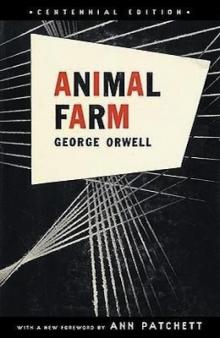 Animal Farm & 1984
Animal Farm & 1984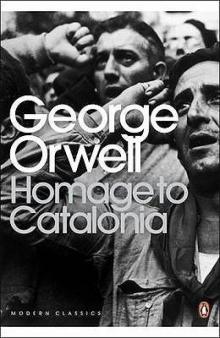 Homage to Catalonia
Homage to Catalonia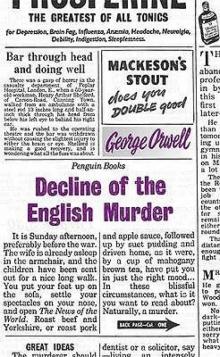 Decline of the English Murder
Decline of the English Murder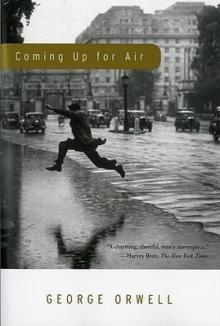 Coming Up for Air
Coming Up for Air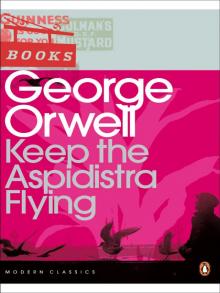 Keep the Aspidistra Flying
Keep the Aspidistra Flying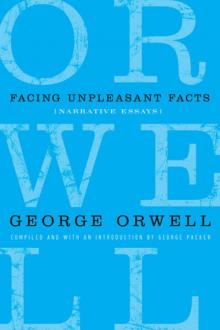 Facing Unpleasant Facts: Narrative Essays
Facing Unpleasant Facts: Narrative Essays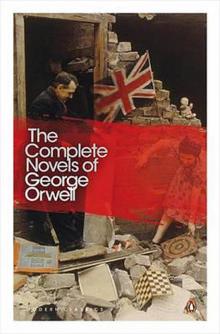 The Complete Novels of George Orwell
The Complete Novels of George Orwell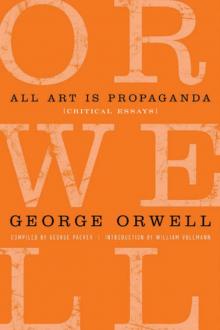 All Art Is Propaganda: Critical Essays
All Art Is Propaganda: Critical Essays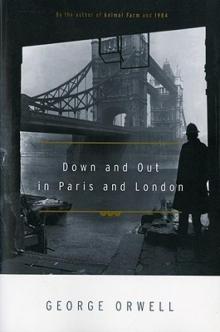 Down and Out in Paris and London
Down and Out in Paris and London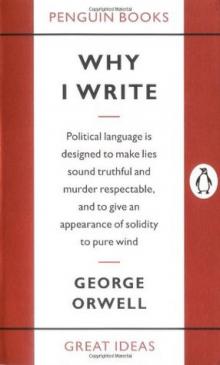 Why I Write
Why I Write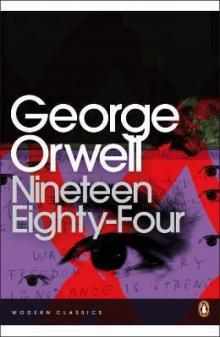 Nineteen Eighty-Four
Nineteen Eighty-Four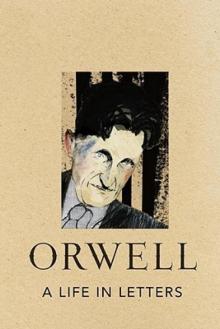 A Life in Letters
A Life in Letters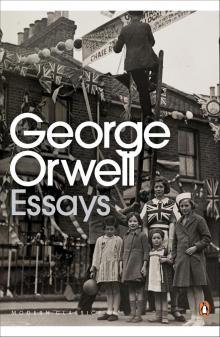 Essays
Essays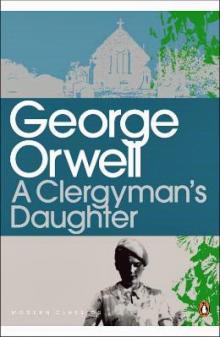 A Clergyman's Daughter
A Clergyman's Daughter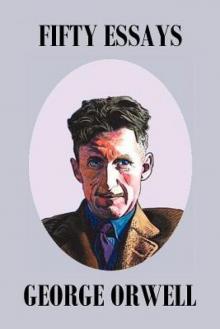 Fifty Orwell Essays
Fifty Orwell Essays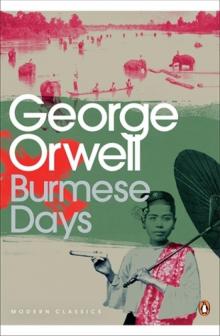 Burmese Days
Burmese Days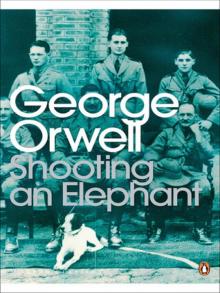 Shooting an Elephant
Shooting an Elephant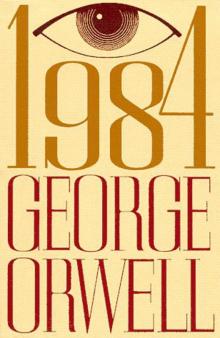 1984 (Penguin)
1984 (Penguin)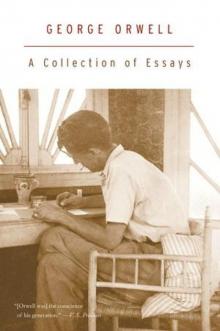 A Collection of Essays
A Collection of Essays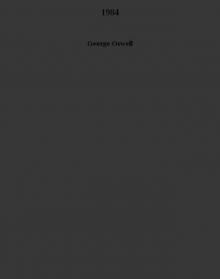 1984
1984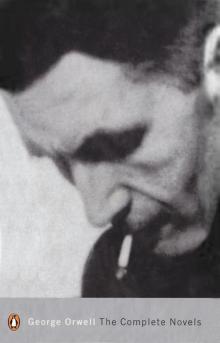 The Complete Novels
The Complete Novels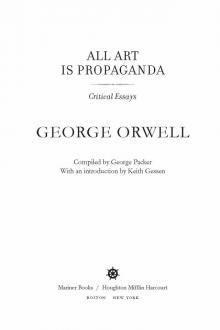 All Art Is Propaganda
All Art Is Propaganda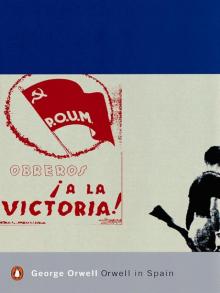 Orwell in Spain
Orwell in Spain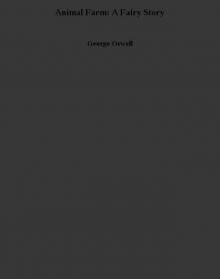 Animal Farm: A Fairy Story
Animal Farm: A Fairy Story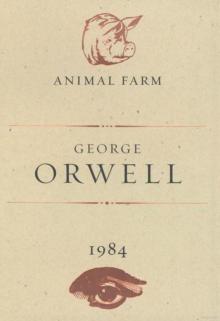 Animal Farm and 1984
Animal Farm and 1984